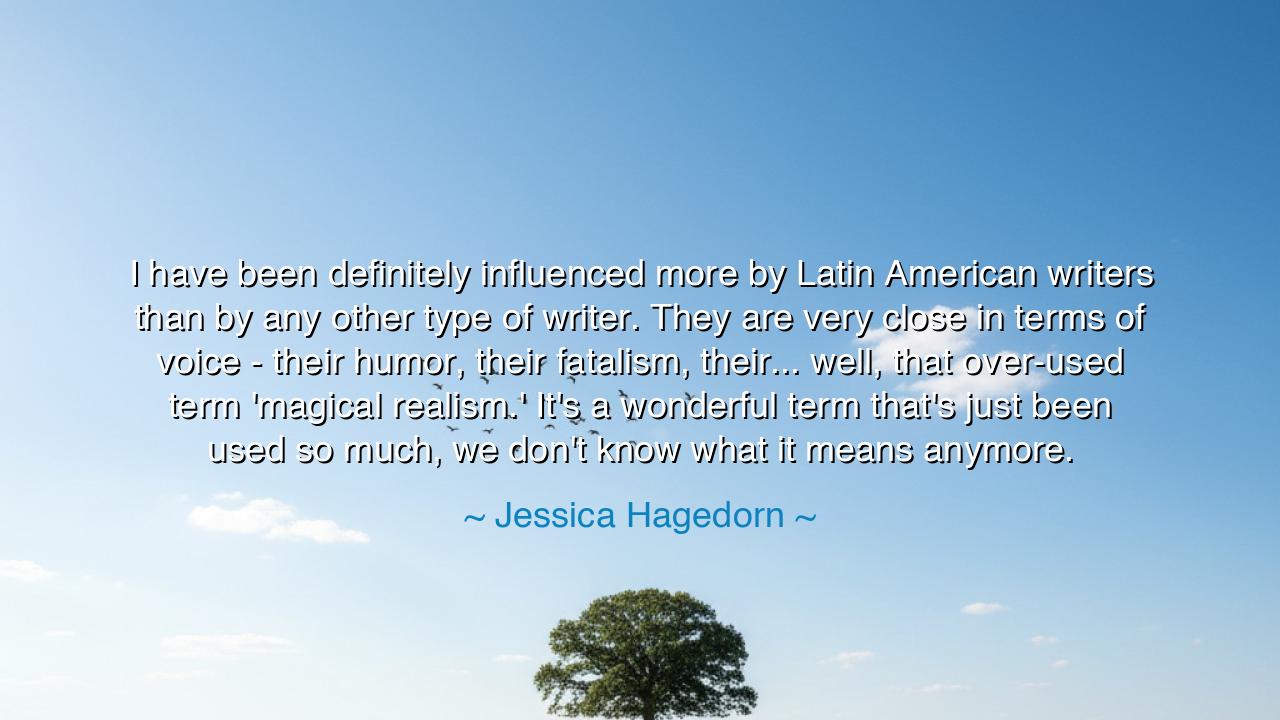
I have been definitely influenced more by Latin American writers
I have been definitely influenced more by Latin American writers than by any other type of writer. They are very close in terms of voice - their humor, their fatalism, their... well, that over-used term 'magical realism.' It's a wonderful term that's just been used so much, we don't know what it means anymore.






When Jessica Hagedorn said, “I have been definitely influenced more by Latin American writers than by any other type of writer. They are very close in terms of voice – their humor, their fatalism, their… well, that over-used term ‘magical realism.’ It’s a wonderful term that’s just been used so much, we don’t know what it means anymore,” she spoke as both artist and truth-seeker. Beneath her reflection lies a meditation on the living pulse of storytelling itself—how cultures breathe through their literature, and how certain voices awaken in us a kinship deeper than nation or language. Her words remind us that the soul of writing is not bound by borders; it is shaped by voice, by humor, by fatalism, and by that shimmering mystery of the human condition we call magic.
The origin of this thought lies in Hagedorn’s own identity and craft. Born in the Philippines and raised amid the currents of migration, she grew up between worlds—Asian and Western, colonized and modern, mythic and real. In the works of Latin American writers like Gabriel García Márquez, Isabel Allende, and Julio Cortázar, she recognized a spiritual twinship. These authors spoke from societies also marked by colonization, faith, struggle, and imagination. Their voices carried the same rhythms of laughter and lament, the same sense that life is both tragic and divine. Through them, Hagedorn found a mirror for her own voice: one that could speak of oppression with humor, of despair with grace, and of reality through the lens of wonder.
When she speaks of humor and fatalism, she is naming the two eternal companions of the oppressed soul. Humor is the shield of survival—the way people laugh at their wounds to keep from bleeding to death. Fatalism is the wisdom of endurance—the understanding that life will break us, yet we must keep singing. Latin American literature, like the stories of Hagedorn’s own homeland, carries both qualities in its marrow. In these tales, ghosts walk among the living, dictators rise and fall like storms, and love blooms even in the ruins of history. It is laughter in the face of tragedy, faith in the face of failure—a defiant hope that refuses to die.
Her mention of “magical realism” is both reverent and weary. She calls it “a wonderful term that’s just been used so much, we don’t know what it means anymore.” To understand this is to understand the nature of art itself: that when the extraordinary becomes familiar, its meaning fades. Magical realism was never meant to be a label; it was a vision, a way of seeing the world as the ancients once did—where myth and memory, heaven and earth, exist side by side. It was not about magic invading reality, but reality revealing its own magic. For the poor, the forgotten, the colonized, the miraculous was never far away. The dead whispered through the walls, saints walked among the suffering, and love could raise the living from despair. Hagedorn laments that the phrase has become a fashion, its sacredness dulled by overuse, yet she keeps its spirit alive in her own work, where imagination becomes a weapon of truth.
Consider the story of Gabriel García Márquez, whose One Hundred Years of Solitude turned the forgotten village of Macondo into a myth for all humanity. In his world, time circles like a wheel, and rain can fall for four years straight. Yet every strange occurrence feels true, because it arises from the heart’s reality, not the intellect’s invention. Márquez once said that in Latin America, “we have had to ask real questions that sound fantastic.” The child who sees angels on a balcony, the mother who ascends into heaven while folding laundry—these are not lies, but metaphors for survival. They are the language of people who live between miracle and misery. Hagedorn recognized this same duality of wonder and suffering in her own Filipino heritage, and in it she found her creative lineage.
Through this connection, Hagedorn’s words teach us a profound lesson about art and identity: that true influence is not imitation, but recognition. To be influenced, in the deepest sense, is to find in another’s story the echo of your own soul. It is to see that across oceans and centuries, human beings are bound by shared longing, shared struggle, shared laughter. The Latin American voice that shaped her was not foreign—it was familiar, because it spoke the universal dialect of resilience. In acknowledging this influence, she also teaches us humility: that every artist, every thinker, stands upon the shoulders of others, carried forward by the chorus of the past.
So, my children of the word and the heart, take this wisdom into your own craft and living. Seek voices that awaken your spirit, even if they are not your own. Do not chase trends or cling to labels, for even the most beautiful term—like “magical realism”—can lose its power when stripped of soul. Instead, seek the magic in truth and the truth in magic. Let your humor temper your sorrow, your imagination deepen your realism, and your voice join the eternal symphony of humanity.
And thus, remember the wisdom of Jessica Hagedorn: that art is born not from imitation, but from kinship—a shared voice across lands and generations, laughing at fate and finding light in darkness. The writer’s task, and indeed every soul’s, is to keep that light alive—to speak in many tongues, yet sing with one heart. For in the union of humor, fatalism, and wonder, the human story is not merely told—it is reborn.






AAdministratorAdministrator
Welcome, honored guests. Please leave a comment, we will respond soon